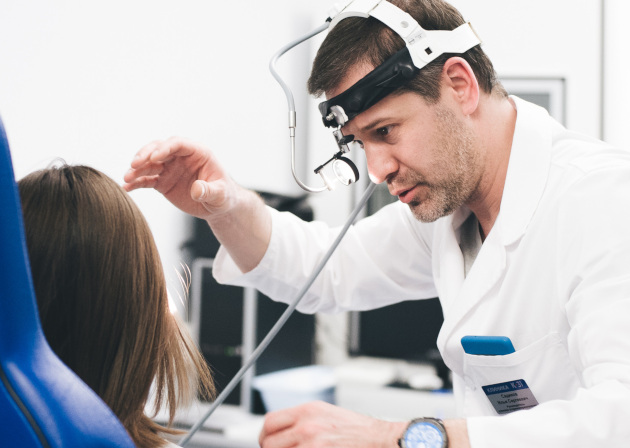Nasal block

specialists

equipment

treatment

Indications for the procedure
- Chronic rhinitis - allergic, vasomotor, medicinal
- Rehabilitation after nose surgery
- Some neurological pathologies - trigeminal neuralgia
- Rhinosinusitis
- Vascular pathologies of the inner ear
- Sinusitis
- Tinnitus, headaches
- Facial injuries
Contraindications to endonasal blockade

The procedure is prescribed to prevent possible complications, such as headaches or blurred vision.
Injections are contraindicated when:
- Patient age under 12 years
- Pregnancy and lactation
- Allergies to medications used
- Exacerbation of acute respiratory diseases with swelling of the nasopharynx
- Bleeding disorders
- Severe systemic diseases (epilepsy, asthma, diabetes)
Nasal blockade with Dexamethasone is carried out if the patient does not have an allergic reaction. To prevent complications, the doctor may pre-order a drug tolerance test.
General information about the procedure
Immediately after injection, the drug is absorbed into the mucous membrane and affects the nerve endings. As a result, tissue trophism and nasal breathing are restored, anti-inflammatory processes are activated, congestion, pain and dryness of the mucous membrane go away.
In case of swelling due to injury or rehabilitation, after turbinate plastic surgery, injections help relieve swelling and pain, restore blood circulation in the submucosa and eliminate itching. The effect lasts for a long time - up to 6 months.
The next day after the blockade, the patient should come to the doctor for an examination. If an inflammatory reaction occurs, nasal rinsing is prescribed. Repeated procedures are prescribed only in the absence of a pathological process.

- Anesthesia
- Relief of allergic reactions and inflammation
- Removing swelling of the mucous membrane
- Normalization of secretion of intranasal glands
- Elimination of itching and burning

How is an appointment with an otolaryngologist at K+31?
Our doctors
Make an appointment at a convenient time on the nearest date

This award is given to clinics with the highest ratings according to user ratings, a large number of requests from this site, and in the absence of critical violations.

This award is given to clinics with the highest ratings according to user ratings. It means that the place is known, loved, and definitely worth visiting.

The ProDoctors portal collected 500 thousand reviews, compiled a rating of doctors based on them and awarded the best. We are proud that our doctors are among those awarded.
Price





























About the service
Intranasal blockade is used to relieve nasal congestion in various ENT diseases. The procedure has a quick and lasting effect. Injections of medications performed directly into the site of swelling bring more pronounced results compared to the use of drops, sprays or tablets.
A nasal injection for nasal congestion is indicated when other forms of endonasal treatment are impossible or do not bring results. The doctor decides to perform a blockade based on diagnosis and taking into account the patient’s medical history. The drug (anti-inflammatory, decongestant, painkillers) is selected depending on the diagnosis and purpose of the procedure.